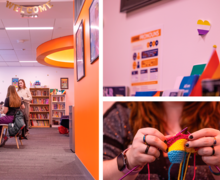Professors redesign, cancel midterm exams due to online learning
Emily Steinberger | Photo Editor
In-person instruction for the fall semester began Aug. 24 and will end shortly before Thanksgiving.
The Daily Orange is a nonprofit newsroom that receives no funding from Syracuse University. Consider donating today to support our mission.
With stress mounting and students still navigating unfamiliar online platforms, some Syracuse University professors redesigned midterm projects and exams this semester while others abandoned them altogether.
For many SU faculty members, the choice to cancel or redesign midterms hinged on their ability to create an online testing strategy that students could easily use while upholding academic integrity. Others saw eliminating or reimagining midterms as a way to alleviate stress and anxiety for students, which some professors said has become increasingly prevalent during the pandemic.
Julie Hasenwinkel, a biomedical and chemical engineering professor, usually gives two midterm exams and a final exam in her upper-level class. The 30-person class of seniors and graduate students meets primarily in person.
This year, Hasenwinkel decided not to give any midterms and has instead implemented weekly 20-minute quizzes that students complete during class.
“(The quizzes were) an adaptation that I made so that we didn’t have to manage long exams with some students online and some students in the classroom,” Hasenwinkel said.
Hasenwinkel uses a flipped approach to teaching this semester, posting recorded lectures before class and using in-person class time for projects and problem-solving. She has also turned group projects into individual projects this semester to avoid complications that might arise if students have to quarantine.
Instead of taking a final exam this fall, students will present research projects they’ve been working on throughout the semester, she said.
Redesigning her course’s testing schedule was a practical choice, but it has also helped reduce the burden on students who are struggling this semester, Hasenwinkel said.
I've been teaching for a long time, and I do really feel the sense that everyone is more stressed this semester. It's palpable in the classroom, and for students and faculty.Julie Hasenwinkel, a biomedical and chemical engineering professor
“I’ve been teaching for a long time, and I do really feel the sense that everyone is more stressed this semester,” she said. “It’s palpable in the classroom, and for students and faculty.”
Harriet Brown, a magazine, news and digital journalism professor, teaches two classes fully online this semester and co-teaches another using a hybrid course model, where some students join class virtually while others are in the classroom.
While Brown usually gives a midterm exam in her beauty and diversity in fashion class, she decided to call it off this semester in the best interest of her students.
“I just honestly felt like students didn’t need that,” Brown said. “Students are struggling hard. I have heard so many stories from students about illnesses, anxiety, depression, family issues, just everything.”
Brown is more flexible with deadlines this semester and spends more class time giving students the opportunity to talk about what is on their minds. There are other ways to check in on students’ progress in the class that don’t involve anxiety-inducing exams, Brown said.
“I would look for other ways to make sure they are getting the material,” she said.
Students are struggling hard. I have heard so many stories from students about illnesses, anxiety, depression, family issues, just everything.Harriet Brown, a magazine, news and digital journalism professor.
Laura Heyman, a professor in the department of transmedia and the art photography program coordinator in the College of Visual and Performing Arts, usually has her students fill out a mid-semester assessment through Blackboard.
Heyman teaches two studio classes that meet once a week for four hours each. The classes aren’t conducive to traditional exams, so Heyman uses the assessment to gauge how students are progressing in the course, she said.
That assessment is available this semester, but fewer students have responded to it than in previous years, Heyman said.
Heyman said mid-semester student feedback surveys administered by SU through Blackboard may be the reason why fewer students are accessing her individual assessment. SU released the first-time surveys, which students could respond to for every class they’re enrolled in, as a way to provide professors and instructors with feedback prior to the end of the semester.
Rethinking assignments and assessments has been challenging, especially when factoring in the physical and emotional health of students, Heyman said.
“Students are really stressed out and frustrated, and trying to accommodate that — trying to strike the balance between making sure they’re motivated and trying to recognize when someone is having trouble and be empathetic — that’s a lot of academic labor and emotional labor,” Heyman said.
Hasenwinkel said she feels fortunate that her students have continued to attend class regularly despite the challenges the pandemic has posed.
“I’ve heard from a lot of colleagues that that’s not the scenario in their classes, and I think it makes it much more challenging,” Hasenwinkel said.
Hasenwinkel will consider similar testing alternatives for the spring semester, she said. The spring semester will begin on Jan. 25 and end April 30, with final exams taking place from May 3 to May 6. There will not be a spring break.
Continued COVID-19-related restrictions along with fewer opportunities for socialization during the winter months means the spring semester could be even more challenging for students than the fall, Brown said. But she said she’s confident that students, professors and staff will manage.
“There’s definitely solace in community, whether it’s virtual or in person, and I’m proud of students and a lot of faculty and definitely staff for coming together with a sense of shared purpose,” Brown said. “At least we’re together in some way.”
Published on October 21, 2020 at 10:48 pm
Contact Michael: msessa@syr.edu | @MichaelSessa3






